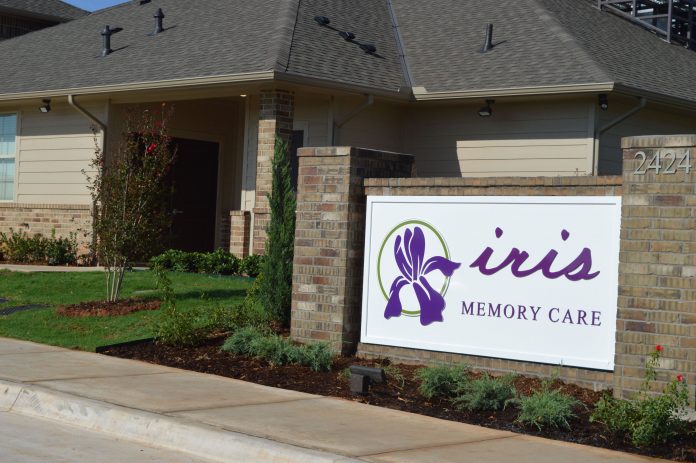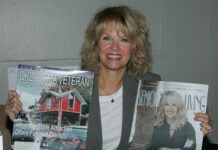
story and photo by Traci Chapman
David Krukiel and Brandon Meszaros had a dream – an idea that could impact how the world saw memory care and change the lives of those people who needed that care.
That dream should become a reality in a few short weeks, when Iris Memory Care opens in Edmond.
After working together for many years, Krukiel and Meszaros decided to strike out on their own. The first step was research – a lot of it, market studies and long days formulating just how they wanted to move forward with their new project. The location actually came relatively easy to the partners.
“We saw that there was a strong need for memory care in Edmond, so we decided to start here,” Krukiel said.
As the partners worked on the physical concept for Iris Memory Care, the most important component would be the caregivers who provide residential care. That’s where Leslie Stone came in, someone Krukiel said he knew would be the key to making sure the foundation of Iris was not only maintained, but would flourish.
“What we always felt was lacking to a degree (in other facilities) was compassion, dignity and comfort, and we searched for someone with a like mind on those concepts,” Krukiel said. “The mission is impossible without the perfect staff.”
“The main thing we always want to remember is how our residents will be feeling, the challenges they face and how we can make every day better for them,” Stone said. “Their families also deserve to know that someone who truly cares for them is there for them every day.”
With Stone on board, the work began in earnest on the building itself, something that would be different than any other memory care facility the team had ever seen, Krukiel said.
“Most of the times you see these large buildings with lots of people, but we don’t believe that’s conducive to the best, the quality care, that people with these challenges face,” he said. “So, we decided – we knew that home is where people feel the most comfortable, and that’s what we did in building Iris.”
The two-building complex will therefore be home to 40 people, 20 in each home. Rooms are set back from the hall, so it doesn’t feel like a hospital or hotel, Krukiel said. The large main room, where residents will eat their meals, is also a gathering place and one set up for recreational activities and visits. A second, smaller day room will provide more of the same, as well as a salon-inspired area.
“Many of memory care residents don’t like to have their hair washed; we thought the idea of the salon could bring back good memories of when they saw their friends at the beauty parlor,” Stone said. “Everything we’re doing is a way to make them feel comfortable and so they want to come out and interact, which can be a challenge with memory care patients.”
Perhaps the main physical feature of the Iris philosophy is its kitchens, designed as an open space, much like in a home. Featuring a granite bar where residents can sit and watch meals prepared or sometimes interact in that preparation, the space is fundamental to the team’s concept.
“It all goes together – we don’t want the residents to feel like numbers, we want them to know they’re cared for, that this really is their home,” Krukiel said. “Staff members will take their meals with the residents, so they have that interaction, as well.”
“They (staff members) are caregivers first, but friends also,” Stone said.
While recreation will play an important part of Iris’ residents lives, so too will something not found at any other Oklahoma memory care facility. Its long name is “Snoezelen Multi-Sensory Environments.”
“Basically, Snoezelen is a term for a variety of relaxing spaces that can help reduce agitation and anxiety, but they are also something that can stimulate the user, encourage communication and help them to interact – with both the unit and with others,” Snoezelen consultant Carolyn Jackson said.
For Iris Memory Care residents, that can be particularly helpful, as those patients frequently encounter “sensory overload.” The soothing lights and colors of the Snoezelen unit can also be accompanied by music, aromatherapy and images, can be something that might make the difference in reaching a particular patient.
“We’ve been told no one else in Oklahoma has a Snoezelen; for the places that do, many of them have a dedicated room for it,” Krukiel said. “We decided to get a smaller unit, but one that would have the ability to be moved from room to room – that way our residents will have better access to it.”
“We just want them to always feel comfortable, always feel safe and loved,” Stone said. “This is just another great way for us to be able to accomplish that.”













